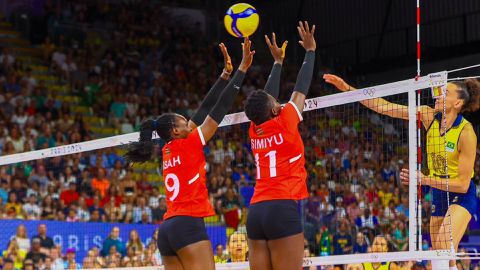The return of Kenya’s women’s volleyball team, Malkia Strikers, from the Paris 2024 Olympics has ignited controversy and debate following the emergence of a video showing the team appearing to be unattended at Jomo Kenyatta International Airport (JKIA). This footage, which has circulated widely online, has raised questions about the level of support and organization for the athletes upon their arrival and has led to widespread speculation regarding the circumstances of their return.
The Malkia Strikers landed back in Kenya on Tuesday night, but their arrival was marred by confusion and concern. The video footage of the team seemingly left without official support at the airport has fueled debate over whether they were abandoned or if they had opted to make their own arrangements for transportation. The team’s struggles in Paris were already well-documented, as they had faced a challenging and disappointing tournament, suffering defeats in all their pool matches.
In the Paris 2024 Olympics, the Malkia Strikers, who have long been a dominant force in African volleyball, struggled to make an impact. Their campaign began with a heavy 3-0 loss to Brazil on July 29, where they were unable to contend with the high level of competition. This defeat was followed by another 3-0 loss to yet another strong opponent. The team’s performance culminated in a final pool match against Japan, where they experienced another straight-sets defeat, ending their Olympic journey without a single victory.
The sight of the team at the airport, appearing to be unattended, prompted immediate reactions from the public and stakeholders in Kenyan sports. Concerns were raised about whether proper arrangements had been made for the athletes, given their challenging performance and the importance of their representation on the global stage.
In response to the controversy, Olympics Kenya swiftly issued a statement to clarify the situation. The organization emphasized that all arriving teams, including the Malkia Strikers, were met by representatives of the Ministry of Sports, who ensured that transport and accommodation were provided for the athletes. The statement also explained that many athletes, after an extended period of competition and training, choose to visit their families immediately upon returning home. This choice was portrayed as a personal decision rather than a reflection of neglect or lack of support.
“The 8th group, including the swimming team and Malkia Strikers, arrived safely in Kenya last night. As with all other arriving teams, they were welcomed by the Ministry of Sports, and transport and accommodation were provided for all Team Kenya athletes. Many athletes choose to visit their loved ones after weeks of training and competition, which is entirely their choice,” the statement read.
The Kenya Volleyball Federation (KVF) also responded to the situation, aiming to dispel any notions of mistreatment. According to KVF, the Malkia Strikers were indeed well-received at the airport. The federation clarified that the players decided to go home with their families rather than participate in formal welcome ceremonies. “KVF has clarified that the Malkia Strikers were well received at the airport but players opted to go home with their families,” reported Carol Radull.
This situation highlights a notable contrast in the reception of different Kenyan teams. The Kenya 7s national team, Shujaa, despite finishing their campaign in Paris with only two wins and placing ninth, received a grand welcome upon their return. This vibrant reception included significant pomp and ceremony, drawing attention to the disparity in how various teams are celebrated and supported upon their return from international competitions.
The differing receptions of the Malkia Strikers and Shujaa have sparked ongoing discussions about the recognition and support provided to Kenyan athletes. It raises questions about the criteria and consistency in how athletes are celebrated based on their performances and the visibility of their achievements. The debate reflects broader issues in sports management and support, shedding light on the need for equitable treatment and recognition of all athletes, regardless of their outcomes.
As Kenya continues to support its athletes, the incident with the Malkia Strikers underscores the importance of clear communication and consistent support for all teams. Ensuring that athletes are adequately supported and celebrated, irrespective of their performance, is crucial for maintaining morale and promoting the spirit of sportsmanship. The focus moving forward should be on learning from these situations to enhance the support and recognition for all Kenyan athletes representing the country on the global stage.
ALSO READ:Firat Highlights How Akumu’s Return Will Boost Harambee Stars’ Performance”


